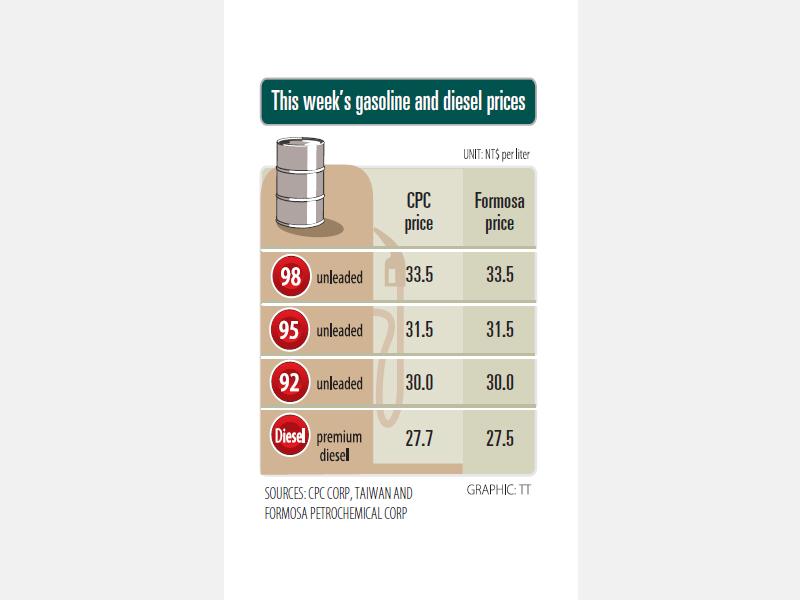Domestic gasoline and diesel prices are to rise by NT$0.4 and NT$0.3 per liter respectively this week, following an increase of NT$0.1 per liter last week, CPC Corp, Taiwan (CPC, 台灣中油) and Formosa Petrochemical Corp (台塑石化) said yesterday.
While international oil prices fell last week, the two companies are this week raising domestic fuel prices after considering factors such as the trend of international oil prices, the exchange rate of the New Taiwan dollar against the US dollar, competition in the domestic market and a government policy of keeping domestic fuel prices lower than in neighboring markets, they said in separate statements.
Gasoline prices at CPC stations are to rise to NT$30, NT$31.5 and NT$33.5 per liter for 92, 95 and 98-octane unleaded gasoline respectively, while the price of premium diesel is to increase to NT$27.7 per liter, the state-run company said.

Formosa Petrochemical said its prices for 92, 95 and 98-octane unleaded gasoline are to rise to NT$30, NT$31.5 and NT$33.5 per liter respectively, while the price of premium diesel is to climb to NT$27.5 per liter.
CPC said global oil prices fell last week as the market sentiment was hit by accelerated rate hikes by major central banks around the world, along with the expansion of Chinese imports of Russian oil, while oil prices were also dragged down by weaker manufacturing purchasing managers’ index data in the US and Europe, Formosa said.

To many, Tatu City on the outskirts of Nairobi looks like a success. The first city entirely built by a private company to be operational in east Africa, with about 25,000 people living and working there, it accounts for about two-thirds of all foreign investment in Kenya. Its low-tax status has attracted more than 100 businesses including Heineken, coffee brand Dormans, and the biggest call-center and cold-chain transport firms in the region. However, to some local politicians, Tatu City has looked more like a target for extortion. A parade of governors have demanded land worth millions of dollars in exchange

Hong Kong authorities ramped up sales of the local dollar as the greenback’s slide threatened the foreign-exchange peg. The Hong Kong Monetary Authority (HKMA) sold a record HK$60.5 billion (US$7.8 billion) of the city’s currency, according to an alert sent on its Bloomberg page yesterday in Asia, after it tested the upper end of its trading band. That added to the HK$56.1 billion of sales versus the greenback since Friday. The rapid intervention signals efforts from the city’s authorities to limit the local currency’s moves within its HK$7.75 to HK$7.85 per US dollar trading band. Heavy sales of the local dollar by

Taiwan Semiconductor Manufacturing Co’s (TSMC, 台積電) revenue jumped 48 percent last month, underscoring how electronics firms scrambled to acquire essential components before global tariffs took effect. The main chipmaker for Apple Inc and Nvidia Corp reported monthly sales of NT$349.6 billion (US$11.6 billion). That compares with the average analysts’ estimate for a 38 percent rise in second-quarter revenue. US President Donald Trump’s trade war is prompting economists to retool GDP forecasts worldwide, casting doubt over the outlook for everything from iPhone demand to computing and datacenter construction. However, TSMC — a barometer for global tech spending given its central role in the

An Indonesian animated movie is smashing regional box office records and could be set for wider success as it prepares to open beyond the Southeast Asian archipelago’s silver screens. Jumbo — a film based on the adventures of main character, Don, a large orphaned Indonesian boy facing bullying at school — last month became the highest-grossing Southeast Asian animated film, raking in more than US$8 million. Released at the end of March to coincide with the Eid holidays after the Islamic fasting month of Ramadan, the movie has hit 8 million ticket sales, the third-highest in Indonesian cinema history, Film